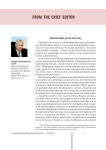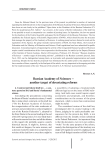Economic and Social Changes: Facts, Trends, Forecast @volnc-esc-en
Статьи журнала - Economic and Social Changes: Facts, Trends, Forecast
Все статьи: 1763
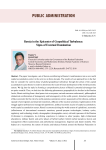
Russia in the epicenter of geopolitical turbulence: signs of eventual domination
Статья научная
The paper investigates a set of factors contributing to Russia’s transformation into a new world capital accumulation center in the next two to three decades. The novelty of our approach lies in the fact that we consider the current phase of global geopolitical turbulence through the prism of the capital accumulation cycles theory in order to determine the vector of future development of the world economic system. We dig into the topic by forming a comprehensive picture of Russia’s potential advantages that are quite versatile. Thus, we look into the following phenomena: geographical (ice decline in the Russian Arctic; Russia evolving from a land power into a sea power; natural resources endowment), philosophical (dialectical confrontation of homogeneity and heterogeneity of the world system), historical (syndrome of false contender for the role of a world capital accumulation center; passionarity of the ethnos), political (parade of sovereignties and imperial revanchists, diffusion of the nuclear syndrome, legitimization of the struggle against political and managerial opposition), political economy (cycles of capital accumulation; world capital accumulation center; Russia’s economy joining the world system of capitalism), economic (effectiveness of international economic sanctions; general-purpose technologies; industry cycles; regulatory and technology triads), demographic (demographic curse), cultural (openness of the Russian Civilization to immigrants, its civilizing experience in relation to other peoples, high civilizational absorption), military (latent and active phases of hybrid warfare; hybrid warfare paradox), factors and management effects (autonomous and authoritarian management, hegemon and leader models). This helped us to reconstruct the system of checks and balances formed around the Russian Federation in the hybrid warfare between the West and the Non-West. We deepen the analysis by providing our own interpretation of sea states and land states. The main conclusion of the research is that Russia possesses unique geopolitical advantages that allow it to successfully counteract the Collective West and eventually become a new leader of the world economic system.
Бесплатно
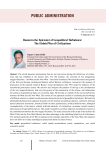
Russia in the epicenter of geopolitical turbulence: the hybrid war of civilizations
Статья научная
The article discusses mechanisms that are put into action during the hybrid war of civilizations that has unfolded at the present time. For this purpose, the concepts of two antagonistic megacivilizations - the West and the Non-West - have been introduced. We reveal the essence and genesis of the First and Second civilizational failures within Western civilization, reconstruct the anatomy of destruction of the national model of Russia’s social development after 1991 under the influence of the neocolonial governance system. We uncover and interpret the paradox of the lag in the development of the two megacivilizations, look into the genesis of the passionarity of the ethnos, and substantiate the primacy of geopolitical logic over economic logic. We provide an outlook of the current hybrid war between the West and the Non-West. The novelty of our approach consists in combining the knowledge of different sciences to explain social processes during the period of geopolitical turbulence. We look into philosophical phenomena (opposite dynamics of the material and spiritual spheres), cybernetic (full and partial cybernetic inversions), historical (birth of ethnic passionarity), political (hybrid wars), biological (neuroplasticity of the brain), cultural (cultural plasticity of civilization), economic (world currency, phenomenon of superprofits) factors. This made it possible to correlate objective and subjective factors in the confrontation between the two megacivilizations. The main conclusion of the study is that neither the West (USA) nor the Non-West (Russia) has clear advantages in the unfolding hybrid war of civilizations. The tactical superiority of the West is opposed to the strategic superiority of the Non-West; this situation does not allow us to make unambiguous predictions about the future winner.
Бесплатно
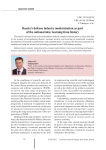
Russia's defense industry modernization: learning from history
Статья научная
The article is devoted to the issue of the defense industry complex modernization as a key direction in the strategy of strengthening Russia’s national security and ensuring its sustainable economic development, increasing its performance and competitiveness. It analyzes the historical experience of creating and using the science and technology potential of the USSR defense industry.
Бесплатно
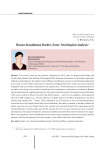
Russia-Kazakhstan border-zone: sociological analysis
Статья научная
The article, based on the research conducted by the Center for Regional Sociology and Conflictology Studies of the Institute of Sociology of RAS, discusses the features of cross-border cooperation of Russia and Kazakhstan. It considers works of Western and Russian scientists to identify major approaches to the study of cross-border cooperation. It discusses strengthening of inter-ethnic and socio-economic integration and cross-border cooperation at the regional level. The borderland as a social phenomenon is an object of our study; the research is focused on local communities, understood as residents of Russian regions bordering with neighboring countries. This means that the research is devoted to local communities of the areas, located on Russia's borders with different states - with the new neighbors, which appeared after the USSR collapse (e.g., Ukraine, Belarus, the Baltic States in the West, Kazakhstan in the East) and the long-existing ones - Turkey, China, Mongolia, etc...
Бесплатно
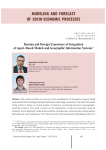
Статья научная
The article provides an overview of the mechanisms of integration of agent-based models and GIS technology developed by Russian and foreign researchers. The basic framework of the article is based on critical analysis of domestic and foreign literature (monographs, scientific articles). The study is based on the application of universal scientific research methods: system approach, analysis and synthesis, classification, systematization and grouping, generalization and comparison. The article presents theoretical and methodological bases of integration of agent-based models and geographic information systems. The concept and essence of agent-based models are explained; their main advantages (compared to other modeling methods) are identified. The paper characterizes the operating environment of agents as a key concept in the theory of agent-based modeling. It is shown that geographic information systems have a wide range of information resources for calculations, searching, modeling of the real world in various aspects, acting as an effective tool for displaying the agents' operating environment and allowing to bring the model as close as possible to the real conditions...
Бесплатно
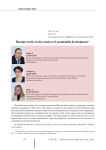
Russian arctic in the context of sustainable development
Статья научная
The article analyzes the socio-economic potential of Russian Arctic regions, by applying a standard statistical reporting for 1990-2011. The analysis is based on the method of critical indicators that made it possible to determine and get an objective assessment of processes taking place in the megaregion. The performed analysis has established that the situation in the Arctic regions sets the development of megaregion within resource-oriented paradigm. The preservation of current trends does not create opportunities even for simple reproduction, imposing significant restrictions on the transition to sustainable territorial development.
Бесплатно
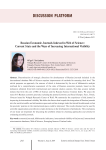
Статья научная
Determination of strategic directions for development of Russian journals included in the international database Web of Science requires improvement of methods for assessing their level. The article proposes an approach, the essence of which is determined by the use of bibliometric analysis methods for a comprehensive assessment of the state of Russian economic journals, based on the indicators obtained from both international and national citation systems. Our data sources include indices that form the core of Web of Science and the Russian Science Citation Index. We assess the state of 18 Russian economic journals, including the journal Economic and Social Changes: Facts, Trends, Forecast issued by Vologda Research Center of RAS. We summarize the experience of this journal in improving its international visibility. We define the factors that impede the integration of Russian journals into the world scientific and information space and outline strategic tasks that should be addressed so that the journals' position in the international space could be improved. The results obtained can be used by scientific organizations and editors to make decisions on the development of periodicals. The conclusions of our study are important for discussing the problem related to choosing approaches and criteria for evaluating scientific journals.
Бесплатно
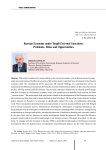
Russian economy under tough external sanctions: problems, risks and opportunities
Статья научная
The article examines key issues related to the current economic crisis in Russia caused by large-scale sanctions imposed by Western countries. We analyze main trends that have developed in the Russian economy after the introduction of the sanctions. We provide findings of a questionnaire survey of representatives of Russian enterprises, showing the reaction of domestic producers to the crisis phenomena of 2022. Having analyzed official statistics, sectoral and corporate information, we identify growth points that have emerged in the Russian economy under new conditions and describe main reasons for these “success stories”. We assess major risks and threats related to the development of the Russian economy in the medium and long term and propose methods to deal with them. We show that under dramatic foreign policy pressure on Russia, it is necessary to significantly expand the scope of mobilization (planning) tools. These mechanisms should provide a prompt solution to such structural problems as the full-fledged revival of key economic sectors, infrastructure development, elimination of regional imbalances, etc. Increasing the role of mobilization tools should be ensured by expanding public investment, strengthening protectionism in foreign trade policy, introducing elements of indicative planning and currency control; at the same time, the key function of market mechanisms should be preserved. We argue that Russia’s economy could make a powerful breakthrough in the modern context. This point is justified, on the one hand, by analogy with the situation in the late 1990s (a powerful breakthrough of the Russian economy immediately after the abandonment of inadequate macrofinancial policy), on the other hand, by the survey data of RAS Institute of Economic Forecasting on a sufficiently high modernization activity of Russian enterprises at the present time.
Бесплатно
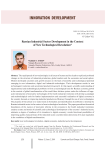
Russian industrial sector development in the context of new technological revolution
Статья
Бесплатно
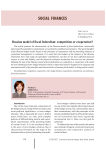
Russian model of fiscal federalism: competition or cooperation?
Статья научная
The article presents the characteristic of the Russian model of fiscal federalism, structurally represented by expenditure commitments, tax authorities and financial assistance. The operating effect of the Russian budget model, based on the principles of cooperation with the prevailing elements of centralized management is evaluated. It is noted that the budgets of the subjects of the Russian Federation have wide range of expenditure commitments, but they do not have sufficient financial sources to cover this liability, and the financial assistance mechanism does not even the situation. Defining the type of the Russian model of fiscal federalism as competitive or cooperative will enable the new reforming of inter-budget relations (which is objectively bound to happen) to be adequate and noncontroversial to the principles and characteristics of mature fiscal model, to bring positive results.
Бесплатно
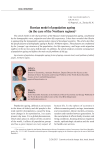
Russian model of population ageing (in the case of the northern regions)
Статья научная
The article dwells on the characteristics of the Russian model of population ageing, conditioned by the demographic wave, migration and short life expectancy. It has been revealed that Russia is approaching the demographic ageing model, typical of developed countries. The article describes the specific features of demographic ageing in Russia’s Northern regions. These features are conditioned by the ‘younger’ age structure of the population, low life expectancy, and large-scale migration outflows in the last two and a half decades. In addition, the article analyzes economic consequences of population ageing and defines the main social problems of old age.
Бесплатно
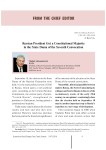
Russian president got a constitutional majority in the State Duma of the seventh convocation
Ред. заметка
Бесплатно
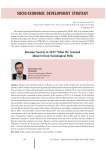
Russian society in 2015: what we learned about IT from sociological polls
Статья научная
Modern socio-political history of Russia can be quite clearly divided into several important periods, each of which is characterized by particular political environment and specific social consciousness. The accession of Crimea and Sevastopol to the Russian Federation in March 2014 is one of the landmark events, a milestone that marks the transition from one phase of this history to the next. This event (or rather, process that started, according to some estimates, in the autumn of 2013, or in February 2014) indicated a sharp turn in Russian foreign policy and in its relations with the West and East. The accession of Crimea has led to phenomenal growth and expansion of support for the policy pursued by Vladimir Putin and for his personality: without exaggeration, he has become not just a political leader but the leader of the nation. The trend set by the accession of Crimea was evolving in 2014-2015; a special feature of this development was that Russia obtained the positive effect almost immediately, and negative consequences followed only after a while...
Бесплатно
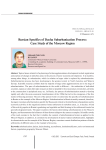
Russian specifics of dacha suburbanization process: case study of the Moscow region
Статья научная
Topical issues related to the planning of urban agglomerations development include registration and analysis of changes in suburban areas in the process of socio-economic development. It is manifest, among other things, in urbanization, which in relation to larger cities is replaced by suburbanization. Suburbanization process has been developing to the greatest extent in North America and Western Europe. Scientific research confirms that the majority of large urban agglomerations are in the stage of suburbanization. The pace of suburbanization in the world is different - the authorities of individual countries, regions or cities often take measures to limit or simplify it: they reconstruct central cities, set limits to the construction in peripheral areas, etc. In Russia, the process of suburbanization started to develop rapidly only after the socio-economic transformation of the 1990s that led to the emergence of the free market of housing and land. The aim of the present work is to determine the specifics of suburbanization in Russia on the example of the Moscow Region...
Бесплатно

Russian statehood in the face of the “corruption of the elites” threat
Статья научная
The article is the final part of the series of publications “From the Editor-in-Chief”, published in 2020 in the journal “Economic and Social Changes: Facts, Trends, Forecast”. Its central problem is the unsatisfactory quality of the ruling elites in Russia which, for almost the entire post-Soviet period, has been the main problem of stalling reforms and achievement of national development goals. The authors analyze the causes of this phenomenon; provide expert assessments and statistical data that allow us to assess the current state of the ruling elites in the country. The article examines the trends of public sentiment as an indicator of the negative consequences of the public administration inefficiency and the unrealization of social expectations from the government and from the President personally. We pay special attention to the content and results of the anti-corruption campaign initiated by the President of the Russian Federation in the mid-2010s. For this purpose, we analyze data of monthly reports of the Ministry of Internal Affairs of the Russian Federation on the state of crime in the Russian Federation for the period from 2003 to October 2020, statistics of the Judicial Department at the Supreme Court of the Russian Federation on the state of criminal records in Russia for the period from 2012 to the first half of 2020, materials of mass media, and opinions of experts. The authors come to the conclusion that it is necessary to move from episodic, or “demonstrative”, criminal cases with a common motive being an internal political processes to systematic preventive work on the nationalization of the ruling elites. Its purpose is not to maintain a balance of interests within the elite groups but to solve the key tasks of national development: achieving social justice, reducing inequality, dynamic growth in the level of income and quality of life of the population. This approach mostly corresponds to the new socially oriented Constitution of 2020, and, ultimately, it allows hoping for the solution of many problems in the system of state administration, as well as for the development of Russian statehood in the civilizational and historical context.
Бесплатно
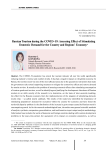
Статья научная
The COVID-19 pandemic has struck the tourism industry all over the world significantly reducing industry’s revenue and number of jobs. It has had a negative impact on the global economy. In Russia, the tourism sector was one of the most affected areas due to the quarantine restrictions that made the government take several supporting measures to mitigate the coronavirus effects and restore demand for tourist services. It actualizes the problem of assessing economic effects after stimulating consumption of tourism goods and services, as well as identifying and justifying the development directions of Russian tourism in un ntific novelty of the research is to determine, on the basis of inter-sectoral modeling, the effect for the Russian economy from the implementation of the program of subsidizing domestic tourist trips - so-called tourist cashback. The results of the study have identified the importance of stimulating population’s demand for recreation within the country for economy and have found the territorial disparity problem in the distribution of the increase in gross output caused by Russian tourist’s consumption growth. As for the research methodological base, the author uses general scientific methods of analysis, synthesis, comparison, generalization, and tools based on input-output analysis methodology. Information base includes the works of domestic and foreign scientists dealing with tourism development problems in the post-crisis period, the assessment of its impact on economic parameters, as well as information from state statistics authorities, data from the World Bank, the World Tourism Organization, and the Russian Public Opinion Research Center. The prospects for future studies are related to designing regional tourism development areas that contribute to the increase in population’s consumption volume of tourist products and growing competitiveness of the latter.
Бесплатно

Russia’s payment system in the new geopolitical and economic conditions: problems and prospect
Статья научная
Taking into account an unprecedented number and quality of packages of external restrictive measures introduced against the financial and real sectors of the Russian economy, the mechanism for ensuring sustainable development of the national economy obviously needs comprehensive adjustment, from the point of view of updating priorities, and from the standpoint of monitoring the level of compliance and adaptation to the emerging challenges. Among the most sensitive restrictions, as envisioned by their initiators, are measures against the Russian financial sector, primarily the payment system and infrastructure. The article presents the results of analyzing the effectiveness of the national payment system in modern conditions. We highlight emerging trends in the activities of payment agents and payment system operators and substantiate promising directions for the development of the national payment infrastructure. The aim of the study is to determine the degree of influence of current challenges and threats on the efficiency and effectiveness of the national payment system. The novelty of the research is associated with the influence of unique external conditions that affect the functioning of the object of research. The set of indicators proposed in the work to assess the effectiveness of the national payment system allows for the system-wide integration of the most important aspects of the changes taking place in the infrastructure of payment systems. The results of the analysis confirm the need for the Bank of Russia to take and implement preventive decisions and introduce infrastructural changes to the operation of the national payment system in the context of escalating external restrictions. The conclusions of the study contain specific measures aimed at improving approaches to determining the effectiveness of the national payment system operators. Our key recommendation is to increase attention to the issues of priority development of payment turnover based on the implementation of innovation technologies and products, comprehensive infrastructure renovation, countering risks and threats in the policy of the Bank of Russia.
Бесплатно
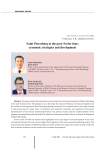
Saint Petersburg in the post-Soviet time: economic strategies and development
Статья научная
This paper studies the main features and results of economic development of Saint Petersburg in the post-Soviet period. The purpose was to determine the extent of influence of urban development on the results of development of Saint Petersburg during this period. The method used in this study consists in the processing of a large array of statistical and analytical materials and regulatory framework; determination of the mutual relationship between the achieved results and the implementation of the program-planning documents that define the objectives, priorities and tasks of socio-economic development of Saint Petersburg. In the course of work the authors have highlighted seven key stages in the development of the city’s economy for the past 22 years, and six stages of development of the socio-economic planning system. The research into the specifics of Saint Petersburg economy within these stages shows that external conditionshave a decisive influence on the results of its economic development...
Бесплатно

